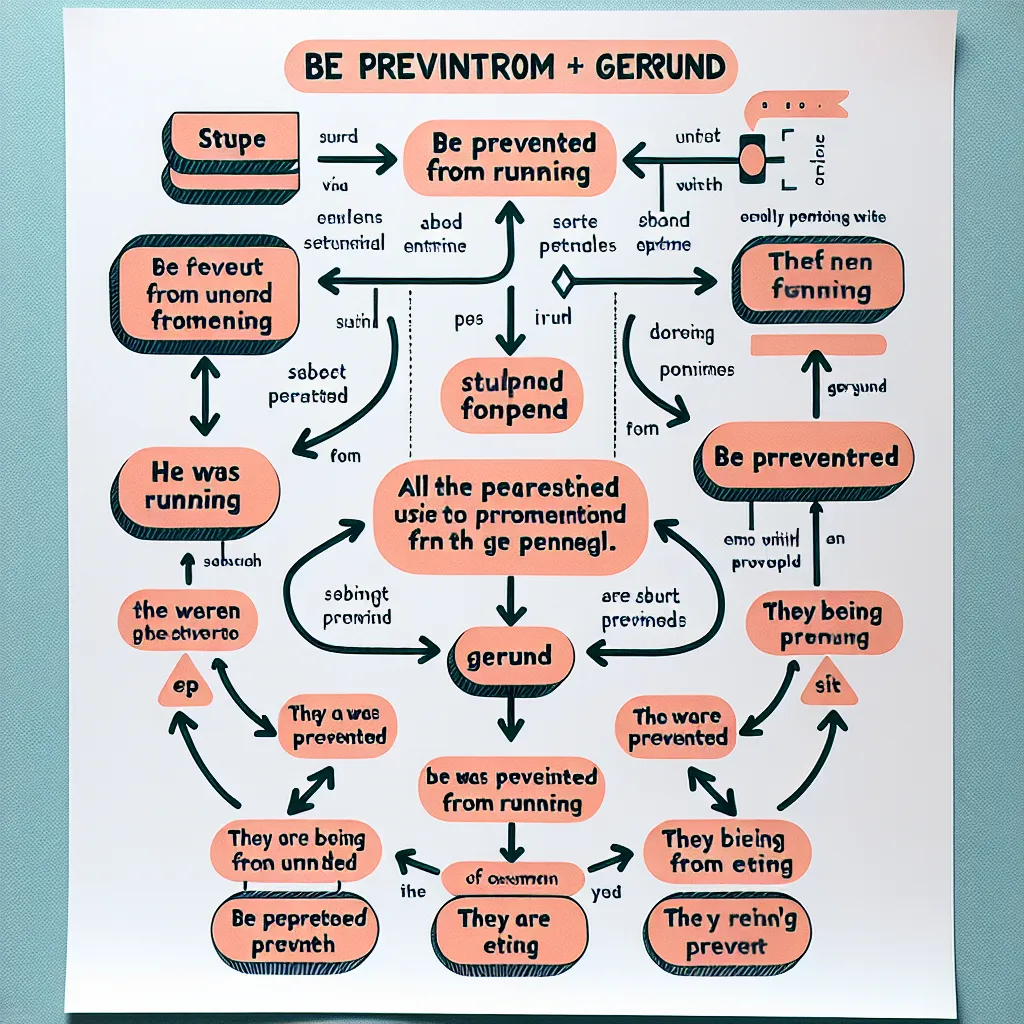The “be prevented from + gerund” structure is a crucial grammatical pattern that frequently appears in IELTS exams. Understanding and effectively using this construction can significantly enhance your language proficiency and boost your IELTS score. Let’s delve into the intricacies of this structure and explore how to apply it in various IELTS contexts.
Understanding the “Be Prevented From + Gerund” Structure
The “be prevented from + gerund” structure is used to express that someone or something is stopped from doing an action. It’s a passive construction that emphasizes the obstruction rather than the agent causing it. This structure is commonly used in formal writing and speech, making it particularly relevant for IELTS tasks.
Formula and Grammar Points
The basic formula for this structure is:
[Subject] + [be] + prevented + from + [verb+ing]
It’s important to note that:
- The verb “be” should be conjugated according to the subject and tense.
- “Prevented” remains in its past participle form.
- The main verb always takes the gerund (-ing) form after “from”.
Examples:
- Students are prevented from using mobile phones during exams.
- The protesters were prevented from entering the building.
- She has been prevented from competing due to her injury.

Application in IELTS Writing
In IELTS Writing tasks, using the “be prevented from + gerund” structure can demonstrate your command of complex grammatical patterns, potentially improving your score in the Grammatical Range and Accuracy criterion.
Task 1 (Academic) – Data Description
When describing trends or processes, this structure can be useful to explain obstacles or limitations:
“Despite government efforts, many developing countries are prevented from achieving sustainable economic growth due to lack of infrastructure.”
Task 2 – Essay Writing
This structure is particularly valuable in Task 2 essays, especially when discussing social issues, policies, or personal opinions:
“In many societies, women are still prevented from pursuing certain career paths due to gender stereotypes.”
“Environmental regulations aim to ensure that companies are prevented from polluting rivers and lakes.”
Enhancing IELTS Speaking Responses
Incorporating the “be prevented from + gerund” structure in your speaking responses can showcase your linguistic versatility:
Part 2 (Cue Card):
“I’d like to talk about a time when I was prevented from attending an important event. Last year, I was prevented from going to my best friend’s wedding because…”
Part 3 (Discussion):
“In some countries, citizens are prevented from accessing certain websites, which raises concerns about freedom of information.”
Common Mistakes and How to Avoid Them
-
Incorrect verb form after “from”:
- Incorrect: “They were prevented from to enter the building.”
- Correct: “They were prevented from entering the building.”
-
Using active voice instead of passive:
- Incorrect: “The rules prevent students from cheating.”
- Correct: “Students are prevented from cheating by the rules.”
-
Forgetting “from”:
- Incorrect: “He was prevented attending the meeting.”
- Correct: “He was prevented from attending the meeting.”
Alternatives and Variations for Higher Band Scores
To achieve higher band scores, consider using these alternatives or variations:
-
“Be barred from + gerund”:
“Journalists were barred from reporting on the sensitive political issue.” -
“Be prohibited from + gerund”:
“Visitors are prohibited from taking photographs inside the museum.” -
“Be deterred from + gerund”:
“Many potential investors are deterred from entering the market due to economic uncertainties.”
These variations can help you avoid repetition and demonstrate a wider vocabulary range, potentially boosting your Lexical Resource score in IELTS.
Conclusion
Mastering the “be prevented from + gerund” structure is essential for IELTS success. By understanding its usage, avoiding common mistakes, and practicing with variations, you can enhance your writing and speaking responses. Remember to use this structure naturally and appropriately in context, and always aim to combine it with other complex structures to showcase your full range of English language skills.
To further improve your grasp of complex grammatical structures for IELTS, you might also want to explore the use of despite and in spite of, which can complement the “be prevented from + gerund” structure in expressing contrasts and obstacles.